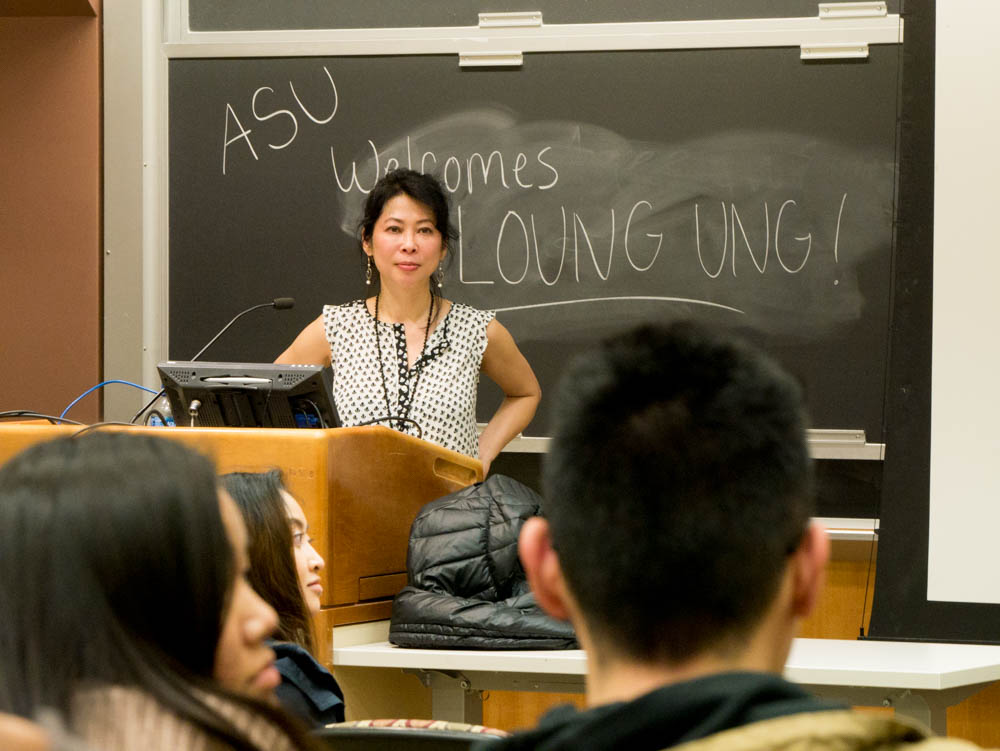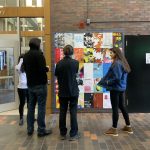
Loung Ung stood in the College of Arts and Sciences Thursday and told her story of surviving the Cambodian genocide. By the end, she had moved students to tears.
BU’s Asian Student Union hosted Ung to screen her new movie “First They Killed My Father” and hold a Q&A session after with event attendees. Ung authored the memoir of the same name, published in 2000, and later co-produced the film with Angelina Jolie.
The movie followed the events of the book, detailing the experiences of Ung and her family during the mass killing of the Cambodian people under the Khmer Rouge in the late 1970s.
“It’s important for our members to hear her message because as minorities, it can still seem like we don’t have a voice,” Valerie Nam, a sophomore in Sargent College of Health and Rehabilitation Sciences and secretary of ASU, wrote in an email to The Daily Free Press. “Loung Ung makes it very clear that our stories, ideas, and feelings are all valid and deserve to be known.”
Since the film was based on Ung’s experiences, she said one of the most important factors in making the film was keeping it authentic. It was shot entirely in Cambodia with Cambodian actors speaking Khmer, the country’s most common language.
“Being able to do this kind of story in our own native language is so much more soulful,” Ung said. “It felt like it was connected to our humanity and our soul and our stories, and it wasn’t just something we were putting out there for the audience, but for ourselves.”
Ung also spoke about her desire for the movie to be nearly scoreless. Ninety percent of artists, including musicians, were killed during the genocide because they were seen as threats to the unified working people that the Khmer Rouge was trying to create.
“Cambodia is a singing, musical culture. During the war, Cambodia was a silent nation,” she said.
One scene shows a character navigating a minefield. Attendees at the screening reacted with gasps, screams and sobs.
“I felt very emotionally connected to the landmine scene,” said Chloe Torres, a freshman in the Questrom School of Business and a representative for ASU.
Ung explained that she needed to shoot this scene perfectly because these weapons stay active in the ground for decades after their installment and still endanger Cambodians today.
Ung worked for the International Campaign to Ban Landmines in Washington, D.C., which aims to raise awareness about the problem, provide care for those affected and work toward a worldwide ban on using landmines.
Nam said she doesn’t believe information about the Khmer Rouge regime and the Cambodian lives that were lost are taught in American schools.
“This is why ASU is so thankful for Loung Ung and proud of the success of her film,” Nam wrote in an email. “We hope other Asians or Asian-Americans are inspired to do the same with their own experiences because we will finally get to spotlight our history, too; ones that we could never forget and hope that the rest of the world doesn’t either.”
Through diseases, forced labor, executions and starvation, an estimated 1.7 to 2 million Cambodians lost their lives during the Khmer Rouge’s reign under the Prime Minister Pol Pot. In his last interview before his death, Pol Pot said everything he did in Cambodia was out of love for the country and that he wanted to return it to former glory.
Ung said the death of the politician on April 15, 1998 prompted her memoir.
“I just thought, people can’t hear that as his last words. Love does not [make] a genocide,” she said.
Almost exactly 20 years later, Ung retold her story before a crowd of BU students and spoke about her desire to create a more peaceful world.
“With my pen, I was going to show the world the real story of love,” Ung said. “Love of family, love of siblings, love of country, love of food, love of flowers, love of the dirt and the trees and the grass and the fields and the rice. I wanted to tell the story of what love looks like to actual Cambodians.”




